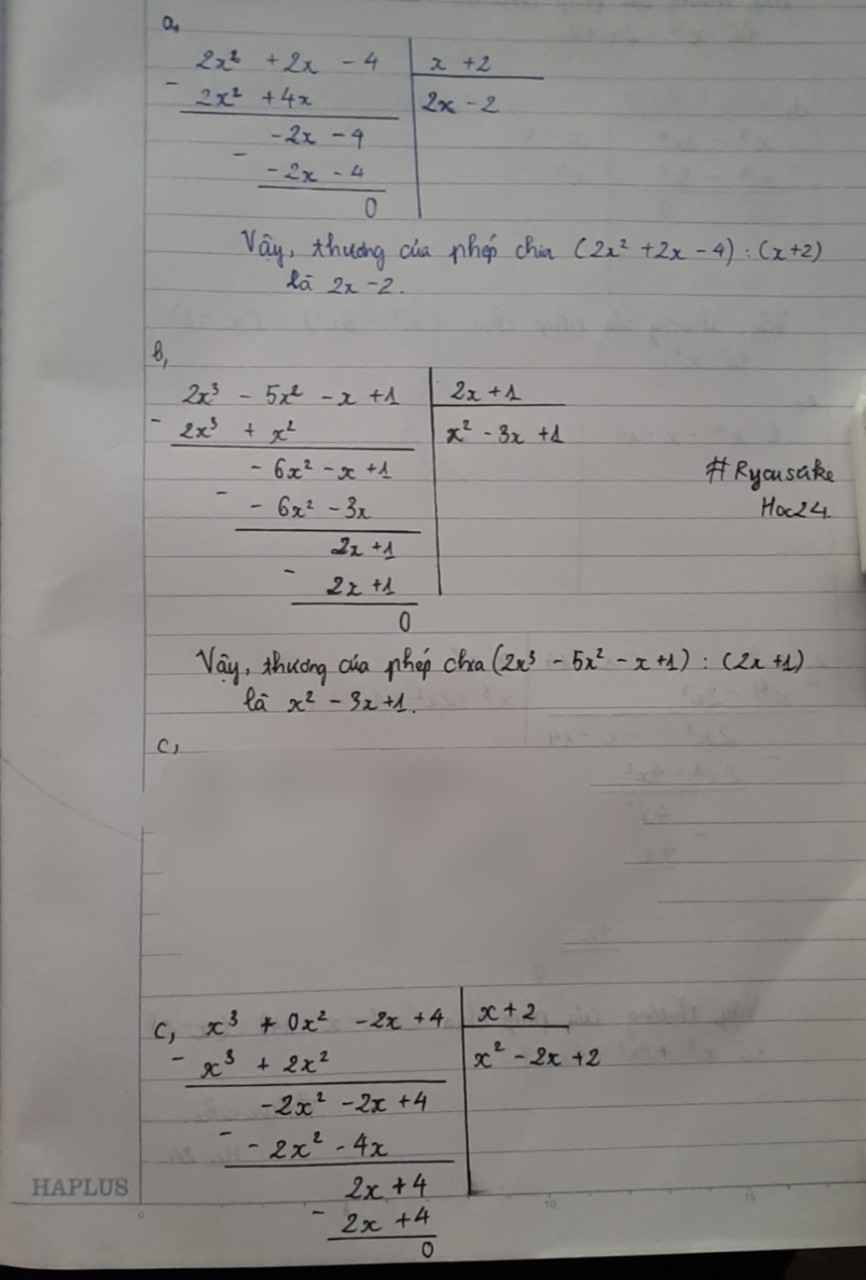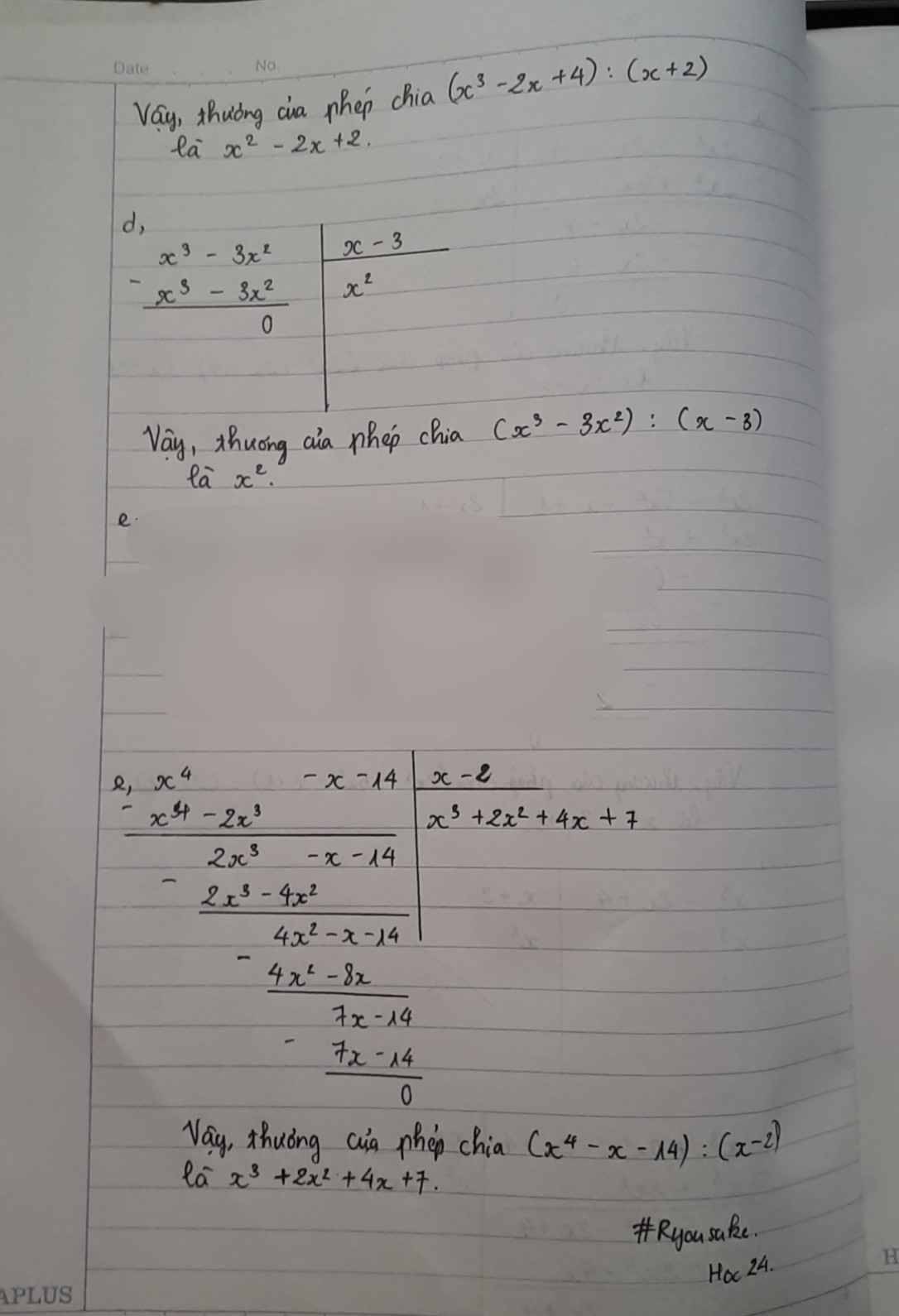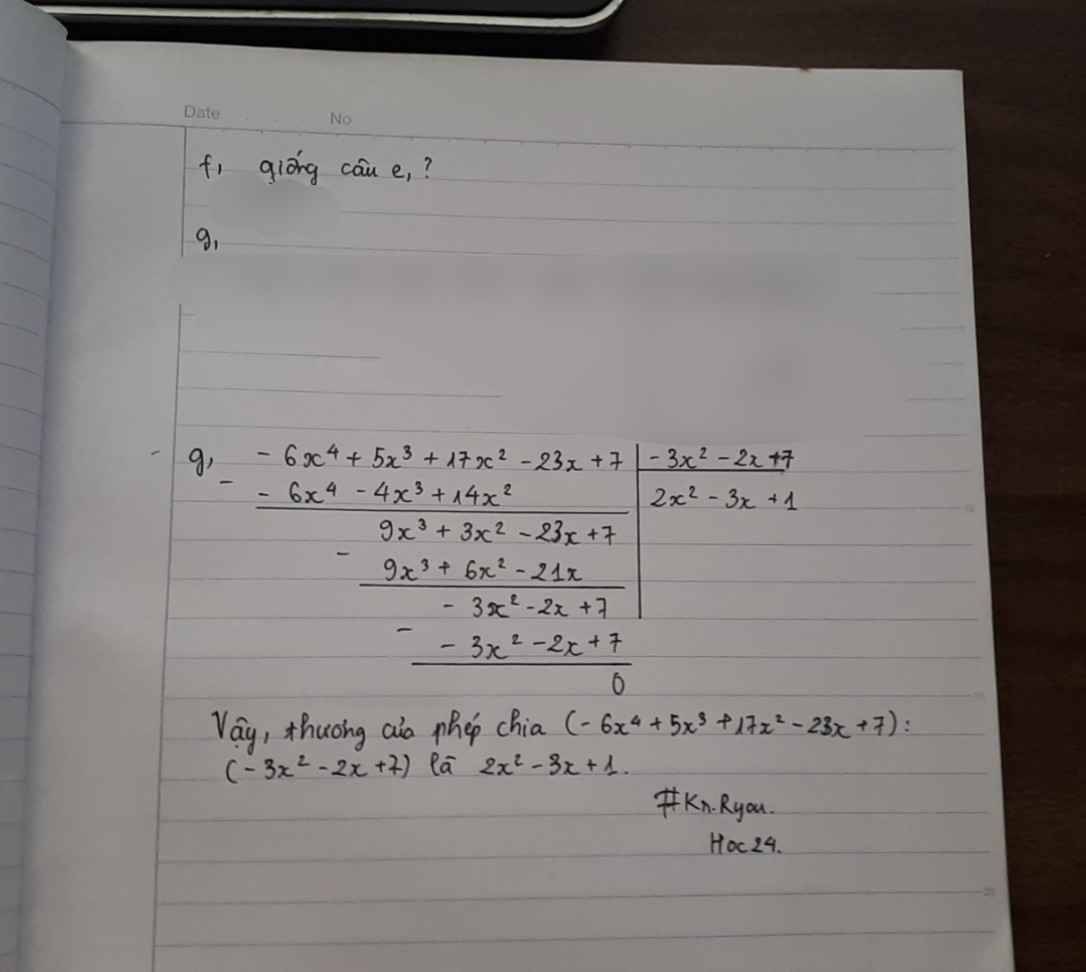*Dạng 2: Đa thức BT1: Thực hiện phép tính a) 3x(x^2-5x+7) b) (x+4)(-x^2+6x+5) c) (3x-1)(3x+5)-7(x^2+2) d) (-5x^5 + 2x^4 - 1/3x^3): (-1/2x^3)
Hãy nhập câu hỏi của bạn vào đây, nếu là tài khoản VIP, bạn sẽ được ưu tiên trả lời.


Giải như sau.
(1)+(2)⇔x2−2x+1+√x2−2x+5=y2+√y2+4⇔(x2−2x+5)+√x2−2x+5=y2+4+√y2+4⇔√y2+4=√x2−2x+5⇒x=3y(1)+(2)⇔x2−2x+1+x2−2x+5=y2+y2+4⇔(x2−2x+5)+x2−2x+5=y2+4+y2+4⇔y2+4=x2−2x+5⇒x=3y
⇔√y2+4=√x2−2x+5⇔y2+4=x2−2x+5, chỗ này do hàm số f(x)=t2+tf(x)=t2+t đồng biến ∀t≥0∀t≥0
Công việc còn lại là của bạn !
\(\left(x+6\right)\left(2x+1\right)=0\)
<=> \(\orbr{\begin{cases}x+6=0\\2x+1=0\end{cases}}\)
<=> \(\orbr{\begin{cases}x=-6\\x=-\frac{1}{2}\end{cases}}\)
Vậy....
hk tốt
^^

a: \(=\dfrac{2x^4+x^3-5x^2-3x-3}{x^2-3}\)
\(=\dfrac{2x^4-6x^2+x^3-3x+x^2-3}{x^2-3}\)
\(=2x^2+x+1\)
b: \(=\dfrac{x^5+x^2+x^3+1}{x^3+1}=x^2+1\)
c: \(=\dfrac{2x^3-x^2-x+6x^2-3x-3+2x+6}{2x^2-x-1}\)
\(=x+3+\dfrac{2x+6}{2x^2-x-1}\)
d: \(=\dfrac{3x^4-8x^3-10x^2+8x-5}{3x^2-2x+1}\)
\(=\dfrac{3x^4-2x^3+x^2-6x^3+4x^2-2x-15x^2+10x-5}{3x^2-2x+1}\)
\(=x^2-2x-5\)

\(a,3\left(2x-3\right)+2\left(2-x\right)=-3\\ \Leftrightarrow6x-9+4-2x=-3\\ \Leftrightarrow4x=2\\ \Leftrightarrow x=\dfrac{1}{2}\\ b,x\left(5-2x\right)+2x\left(x-1\right)=13\\ \Leftrightarrow5x-2x^2+2x^2-2x=13\\ \Leftrightarrow3x=13\\ \Leftrightarrow x=\dfrac{13}{3}\\ c,5x\left(x-1\right)-\left(x+2\right)\left(5x-7\right)=6\\ \Leftrightarrow5x^2-5x-5x^2-3x+14=6\\ \Leftrightarrow-8x=-8\\ \Leftrightarrow x=1\\ d,3x\left(2x+3\right)-\left(2x+5\right)\left(3x-2\right)=8\\ \Leftrightarrow6x^2+9x-6x^2-11x+10=8\\ \Leftrightarrow-2x=-2\\ \Leftrightarrow x=1\)
\(e,2\left(5x-8\right)-3\left(4x-5\right)=4\left(3x-4\right)+11\\ \Leftrightarrow10x-16-12x+15=12x-16+11\\ \Leftrightarrow-14x=-4\\ \Leftrightarrow x=\dfrac{2}{7}\\ f,2x\left(6x-2x^2\right)+3x^2\left(x-4\right)=8\\ \Leftrightarrow12x^2-4x^3+3x^3-12x^2=8\\ \Leftrightarrow-x^3-8=0\\ \Leftrightarrow-\left(x^3+8\right)=0\\ \Leftrightarrow-\left(x+2\right)\left(x^2-2x+4\right)=0\\ \Leftrightarrow\left[{}\begin{matrix}x=-2\\x\in\varnothing\left(x^2-2x+4=\left(x-1\right)^2+3>0\right)\end{matrix}\right.\)
Bài 4:
a: Ta có: \(3\left(2x-3\right)-2\left(x-2\right)=-3\)
\(\Leftrightarrow6x-9-2x+4=-3\)
\(\Leftrightarrow4x=2\)
hay \(x=\dfrac{1}{2}\)
b: Ta có: \(x\left(5-2x\right)+2x\left(x-1\right)=13\)
\(\Leftrightarrow5x-2x^2+2x^2-2x=13\)
\(\Leftrightarrow3x=13\)
hay \(x=\dfrac{13}{3}\)
c: Ta có: \(5x\left(x-1\right)-\left(x+2\right)\left(5x-7\right)=6\)
\(\Leftrightarrow5x^2-5x-5x^2+7x-10x+14=6\)
\(\Leftrightarrow-8x=-8\)
hay x=1

a: \(=\dfrac{2\left(x+2\right)\left(x-1\right)}{x+2}=2x-2\)
b: \(=\dfrac{2x^3+x^2-6x^2-3x+2x+1}{2x+1}=x^2-3x+1\)
c: \(=\dfrac{x^3+2x^2-2x^2-4x+2x+4}{x+2}=x^2-2x+2\)
d: \(=\dfrac{x^2\left(x-3\right)}{x-3}=x^2\)

a. (3x - 1).(2x + 7) - (x + 1).(6x - 5) = 16
<=> 6x^2 + 19x - 7 - (6x^2 + x - 5) = 16
<=> 18x - 2 = 16
<=> 18x = 18
<=> x = 1
b. (10x + 9).x - (5x - 1).(2x + 3) = 8
<=> 10x^2 + 9x - (10x^2 + 13x - 3) = 8
<=> -4x + 3 = 8
<=> -4x = 5
<=> x = -5/4
c. (3x - 5).(7 - 5x) + (5x + 2).(3x - 2) - 2 = 0
<=> -15x^2 + 46x - 35 + 15x^2 - 4x - 4 - 2 = 0
<=> 42x - 41 = 0
<=> x = 41/42





a: =3x^3-15x^2+21x
b: =-x^3+6x^2+5x-4x^2-24x-20
=-x^3+2x^2-19x-20
c: =9x^2+15x-3x-5-7x^2-14
=2x^2+12x-19
d: =10x^2-4x+2/3